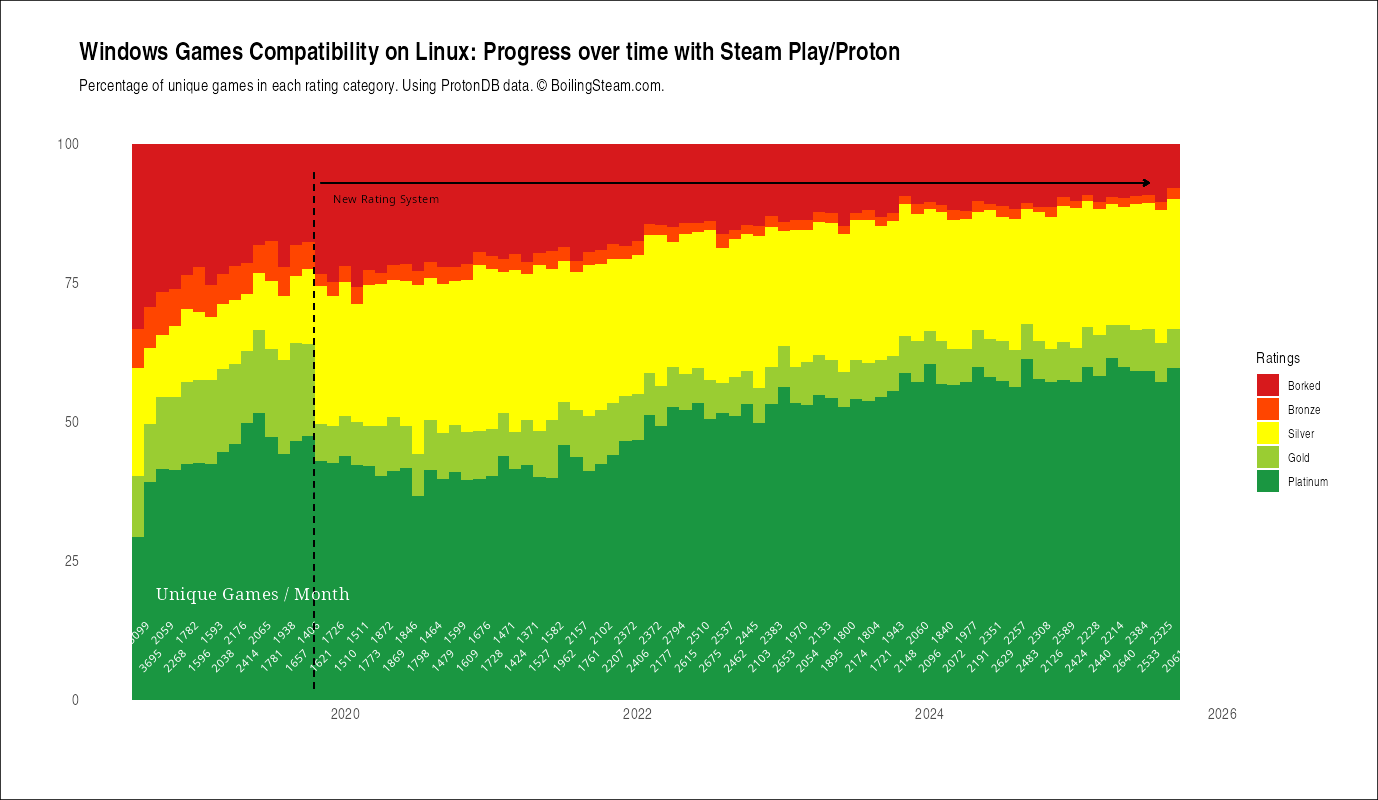Windows Games’ Compatibility on Linux Is at an All-Time High
As you know, we are monitoring ProtonDB fairly regularly to confirm the trends of Linux distribution usage. But you can do a lot of things with this kind of data, including confirming how many games actually work well at the end of the day. ProtonDB used to previously ask users to rate compatibility according to WINE ratings until the end of 2019, and after they switched to collecting observations from users and then deriving a rating by themselves. At Boiling Steam we start from the observations as well to derive our own ratings. This is how they are defined.
- Platinum (Green): Games that run perfectly, out of the box.
- Gold (Light Green): Games that work almost out of the box but need some tweaking or configuration.
- Silver (Yellow): Games that do not work perfectly but are still playable.
- Borked (Dark Red): Games that refuse to launch at all.
- Bronze (Red) : Games for which ratings fall in between Silver and Borked on average
If you were to try to map these ratings to what Valve is doing for the Steam Deck, there would be no direct equivalency since there’s a performance aspect for the Deck that is taken in account, but you could expect something like that:
- Most Platinum games would be Verified or Playable, depending on their performance profile
- Most Gold games would be either Verified or Playable, as Valve does include specific configuration tweaks as well
- Games rated Silver would be either Playable or Unsupported
- Bronze and Borked games would mostly be in the Unsupported category.
The chart looks at these 5 categories over time, with each month taking in account only the unique games with reports in that month. So each month’s sample is a mix of old, recent, or very new titles, with a certain bias towards newer titles since this is what motivates a lot of reports. But popular games that keep on being played also get reports all the time.
Now let’s look at the actual chart!

Key Observations
We can confirm the following:
- The graph shows a steady increase in the percentage of games that run out of the box on Linux, indicating continuous efforts by WINE and Proton developers to support compatibility of new and older titles.
- The progress of the Platinum and Gold categories seem to slow down a little compared to the pace observed in 2022 and 2023 (probably because the Steam Deck’s launch and availability led to an increased focus on making sure most games work)
- More importantly, the amount of games that refuse to launch is at an all-time low. You can see that the area in red has been constantly shrinking, at a steady pace, and this past month is no exception with this category getting very close to just 10%. This means that close to 90% of Windows games manage to launch on Linux.
- The combined area for Platinum and Gold ratings has been consistently high, suggesting that a significant portion of Windows games can run smoothly on Linux with minimal setup.
Some of the games marked as Borked seem to refuse launching because of active developer’s intervention, such as what was recently observed by the MOBA March of Giants. The game refuses to run on Linux by giving a very telling message to the end user:
“The program encoutered E111000B at 00002302 during initialization. Wine, Proton, and Steam Deck are not supported by this application!”
And then there are genuine games that refused to launch at first, such as the MMORPG Blade and Soul NEO, but have since then improved in compatibility while several tweaks are needed.
And there are of course still a few games that seem to resist a lot of efforts, such as the Visual Novel Sickly Days and Summer Traces, while a DLL override seems to make it run after a protontricks install - that kind of thing may be out of the scope of what Valve can do for compatibility.
The other games that can’t be enjoyed are the ones that rely on anti-cheat technology where Linux is not supported (usually on purpose by the developers or publisher). There is not much we can do about this, except making sure that there are more and more gaming devices running Linux out there so that they end up caring about the loss of business. That’s a very long term strategy that will take a while to make an impact.
There’s no Stopping Progress!
The data clearly shows that Windows games compatibility on Linux has been steadily improving over time, even if the end users did not clearly notice it one month after the next. We also know that for a lot of new games, Valve is working directly with the developers or publishers to make sure the game runs as expected on Day 1 of their release, so this is an important factor for the progress we observe in this chart.
Such improvements are also serious arguments to convince other manufacturers to adopt SteamOS for their devices. You don’t get 100% compatibility, but it’s not too far and for the games that really matter we may be at 80% or slightly higher. And not only that, the performance of games on Linux is, on average, better, on the same kind of hardware (at least for AMD). The support of HDR is also getting there (on the desktop as well), so piece by piece many things are coming together.
Linux and SteamOS have now clearly proven that they can be great systems for gaming, and the people who used to laugh about it 5 years ago are less and less vocal now.
You can ignore reality for a while, but not forever.
